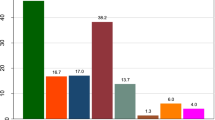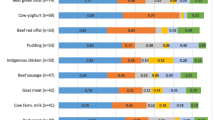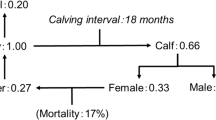Abstract
Livestock forms an integral part and contributes in multiple ways to the livelihoods of smallholder farmers in the crop-livestock systems of Ethiopia. This study presents empirical evidence of the relative importance of the consumption of dairy products to family nutrition and factors underlying differences among farm households. Cattle owning households (n = 270) and their under-5-year-old children (n = 225) were sampled for this study. Multiple approaches were applied for data collection, including a cross-sectional survey, in-depth household monitoring, a dietary diversity survey and anthropometric measurements of children. Household dietary diversity scores were low (4.6 ± 1.3), mainly comprising maize, Enset, green kales and milk products. The consumption of non-dairy Animal Source Foods (ASF: beef, mutton, chicken meat, eggs and fish) was low, intermittent and peaked during major religious or social festivities. Canonical Correlation Analysis (CCA) revealed substantial associations between anthropometric indices of children and socio-economic status of their parents. Specifically, predictors assigned the greatest weights, in descending order, were per capita farmland size, family size, access to clean water, crop diversity, dependency ratio, livestock holding, cash income, literacy of household head, distance to public health centres, and volume of milk available in the households. Although cow milk was identified as an important food item for children, their nutritional status was influenced by manifold factors that affect their dietary quality, health and care. Therefore, holistic approaches that embrace effective coordination among different economic sectors - notably agriculture, public health education and provision of clean water are required to achieve food and nutritional security among farming households.



Similar content being viewed by others
Explore related subjects
Discover the latest articles and news from researchers in related subjects, suggested using machine learning.References
Abebe, Y., Bogale, A., Hambidge, K. M., Stoecker, B. J., Bailey, K., & Gibson, R. S. (2007). Phytate, zinc, iron and calcium content of selected raw and prepared foods consumed in rural Sidama, southern Ethiopia, and implications for bioavailability. Journal of Food Composition and Analysis, 20(3–4), 161–168.
Abebe, Y., Bogale, A., Hambidge, K. M., Stoecker, B. J., Arbide, I., Teshome, A., et al. (2008). Inadequate intakes of dietary zinc among pregnant women from subsistence households in Sidama, southern Ethiopia. Public Health Nutrition, 11(4), 379–386.
Aliamo, K., Olson, M., & Frongillo, A. (2001). Food insufficiency and American school-aged children’s cognitive, academic, and psychosocial development. Pediatrics, 108, 44–53.
Allen, L. H. (2003). Interventions for micronutrient deficiency control in developing countries: past, present and future. Journal of Nutrition, 133(11), 3875S–3878S.
Andersen, P. (2013). Nutrition-sensitive food systems: from rhetoric to action. The Lancet, 382(9890), 375–376.
Ayele, Z., & Peacock, C. (2003). Improving access to and consumption of animal source foods in rural households: the experiences of a women-focused goat development program in the highlands of Ethiopia. Journal of Nutrition, 133(11), 3981S–3986S.
Ayenew, Y.A., Wurzinger, M., Tegegne, A., & Zollitsch, W. (2009). Handling, processing and marketing of milk in the north western Ethiopian highlands. Livestock Research for Rural Development, 21(7). http://www.lrrd.org/lrrd21/7/ayen21097.htm. Accessed 12 Nov 2013.
Barrett, C. B. (2010). Measuring food insecurity. Science, 327, 825–828.
Belachew, T., Hadley, C., & Lindstrom, D. (2008). Differentials in measures of dietary quality among adolescents in Jimma zone, southwest Ethiopia. Ethiopian Medical Journal, 46(2), 133–142.
Belachew, T., Hadley, C., Lindstrom, D., Gebremariam, A., Lachat, C., & Kolsteren, P. (2011). Food insecurity, school absenteeism and educational attainment of adolescents in Jimma Zone Southwest Ethiopia: a longitudinal study. Nutrition Journal, 10(1), 29.
Berti, P. R., Krasevec, J., & FitzGerald, S. (2004). A review of the effectiveness of agriculture interventions in improving nutrition outcomes. Journal of Nutrition, 126(Suppl. 10), 2611–2615.
Betru, S., & Kawashima, H. (2009). Pattern and determinants of meat consumption in urban and rural Ethiopia. Livestock Research for Rural Development, 21(9). http://www.lrrd.org/lrrd21/9/betr21143.htm. Accessed 20 Dec 2013.
Black, R. E., Williams, S. M., Jones, I. E., & Goulding, A. (2002). Children who avoid drinking cow milk have low dietary calcium intakes and poor bone health. American Journal of Clinical Nutrition, 76, 675–680.
Black, R. E., Allen, L. H., Bhutta, Z. A., Caulfield, L. E., Onis, M., Ezzati, M., et al. (2008). Maternal and child undernutrition: global and regional exposures and health consequences. Lancet, 371, 243–260.
Bogale, A., Stoecker, B. J., Kennedy, T., Hubbs-Tait, L., Thomas, D., Abebe, Y., et al. (2013). Nutritional status and cognitive performance of mother-child pairs in Sidama, Southern Ethiopia. Maternal and Child Nutrition, 9(2), 274–284.
Connell, C., Lofton, K., Yadrick, K., & Rehner, T. (2005). Children’s experiences of food insecurity can assist in understanding its effect on their well-being. Journal of Nutrition, 135(7), 1683–1690.
CSA (Central Statistic Agency of Ethiopia) & ICF International (2012). Ethiopia demographic and health survey 2011. Addis Ababa: Central Statistical Agency and ICF International. http://www.measuredhs.com/pubs/pdf/FR255/FR255.pdf. Accessed 25 Oct 2013.
Di Leonardo, R., Adelfio, G., Bellanca, A., Chiodi, M., & Mazzola, S. (2014). Analysis and assessment of trace element contamination in offshore sediments of the Augusta bay (SE Sicily): a multivariate statistical approach based on canonical correlation analysis and mixture density estimation approach. Journal of Sea Research, 85, 428–442.
Dunne, J., Evershed, R. P., Salque, M., Cramp, L., Bruni, S., Ryan, K., et al. (2012). First dairying in green Saharan Africa in the fifth millennium BC. Nature, 486, 390–394.
Elliott, A. C., & Hynan, L. S. (2011). A SAS® macro implementation of a multiple comparison post hoc test for a Kruskal-Wallis analysis. Computer Methods and Programs in Biomedicine, 102(1), 75–80.
Erhardt, J., Seaman, J., Bilukha, O., & Golden, M. (2011). Software for Emergency Nutrition Assessment (ENA for SMART). ENA software download at: http://www.nutrisurvey.de/ena2011/. Accessed 02 Aug 2013.
FAO (1996). Rome declaration on world food security and world food summit plan of action. Rome: FAO. http://www.fao.org/docrep/003/w3613e/w3613e00.htm. Accessed 15 Aug 2013.
FAO. (2011). Guidelines for measuring household and individual dietary diversity. Rome: FAO.
FAO, WFP, & IFAD. (2012). The state of food insecurity in the world 2012. Economic growth is necessary but not sufficient to accelerate reduction of hunger and malnutrition. Rome: FAO.
FAO, IFAD, & WFP. (2013). The multiple dimensions of food security. Rome: FAO.
Fratkin, E., Roth, E. A., & Nathan, M. A. (2004). Pastoral sedentarization and its effects on children’s diet, health, and growth among Rendille of Northern Kenya. Human Ecology, 32, 531–559.
Gabbi, A. M., McManus, C. M., Silva, A. V., Marques, L. T., Zanela, M. B., Stumpf, M. P., et al. (2013). Typology and physical-chemical characterization of bovine milk produced with different productions strategies. Agricultural Systems, 121, 130–134.
Gebremedhin, S., & Enquselassie, F. (2011). Correlates of anaemia among women of reproductive age in Ethiopia: Evidence from Ethiopian DHS (2005). Ethiopian Journal of Health Development, 25(1), 22–30.
Gebremedhin, S., Enquselassie, F., & Umeta, M. (2011). Prevalence of prenatal zinc deficiency and its association with socio-demographic, dietary and health care related factors in rural Sidama, southern Ethiopia: a cross-sectional study. BMC Public Health, 11, 898.
Gibson, R. S., Abebe, Y., Hambidge, K. M., Arbide, I., Teshome, A., & Stoecker, B. J. (2009). Inadequate feeding practices and impaired growth among children from subsistence farming households in Sidama, southern Ethiopia. Maternal and Child Nutrition, 5(3), 260–275.
Hadley, C., Belachew, T., Lindstrom, D., & Tessema, F. (2011). The shape of things to come? Household dependency ratio and adolescent nutritional status in rural and urban Ethiopia. American Journal of Physical Anthropology, 144(4), 643–652.
Hoppe, C., Udam, T. R., Lauritzen, L., Molgaard, C., Juul, A., & Michaelsen, K. F. (2004). Animal protein intake, serum insulin-like growth factor I, and growth in healthy 2.5-y-old Danish children. American Journal of Clinical Nutrition, 80, 447–452.
Hoppe, C., Mølgaard, C., & Michaelsen, K. F. (2006). Cow’s milk and linear growth in industrialized and developing countries. Annual Review Nutrition, 26, 131–173.
Johns, T., Powell, B., Maundu, P., & Eyzaguirre, P. B. (2013). Agricultural biodiversity as a link between traditional food systems and contemporary development, social integrity and ecological health. Journal of the Science of Food and Agriculture, 93(14), 3433–3442.
Legesse, G., Abebe, G., Siegmund-Schultze, M., & Valle Zárate, A. (2008). Small ruminant production in two mixed-farming systems of southern Ethiopia: Status and prospects for improvement. Experimental Agriculture, 44(3), 399–412.
McGarigal, K., Cushman, S., & Stafford, S. (2000). Multivariate statistics for wildlife and ecology research. New York: Springer.
Melesse, K., & Beyene, F. (2009). Consumption pattern of milk and milk products in Ada’aworeda, East Shoa Zone, central Ethiopia. Livestock Research for Rural Development, 21(4).http://www.lrrd.org/lrrd21/4/mele21056.htm. Accessed 23 Sept 2013.
Mohammed, B., Gabel, M., & Karlsson, L. M. (2013). Nutritive values of the drought tolerant food and fodder crop enset. African Journal of Agricultural Research, 8(20), 2326–2333.
Moore, L. L., Bradlee, M. L., Gao, D., & Singer, M. R. (2008). Effects of average childhood dairy intake on adolescent bone health. Journal of Pediatrics, 153, 667–673.
Murphy, S. P., & Allen, L. H. (1997). A greater intake of animal products could improve the micronutrient status and development of children in East Africa. In East Africa Livestock Assessment Workshop Proceedings (pp. 188–196). Davis: Small Ruminant CRSP.
Murphy, S. P., & Allen, L. H. (2003). Nutritional importance of animal source foods. Journal of Nutrition, 133(11), 3932S–3935S.
Negash, A., & Niehof, A. (2004). The significance of enset culture and biodiversity for rural household food and livelihood security in south-western Ethiopia. Agriculture and Human Values, 21(1), 61–71.
Neumann, C. G., Sigman, M., Murphy, S. P., & Allen, L. H. (1997). The role of animal-source foods in improving diet quality and growth and development in young children. In Latin America Regional Livestock Assessment Workshop Proceedings (pp. 191–204). Davis: Small Ruminant CRSP.
Neumann, C., Harris, D. M., & Rogers, L. M. (2002). Contribution of animal source foods in improving diet quality and function in children in the developing world. Nutrition Research, 22(1–2), 193–220.
SAS Institute Inc. (2011). SAS/STAT® 9.3 User’s guide. Cary: SAS Institute Inc.
Smith, J., Sones, K., Grace, D., MacMillan, S., Tarawali, S., & Herrero, M. (2013). Beyond milk, meat, and eggs: role of livestock in food and nutrition security. Animal Frontiers, 3(3), 6–13.
Speedy, A. W. (2003). Global production and consumption of animal source foods. Journal of Nutrition, 133(11 Suppl 2), 4048–4053.
Statheropoulos, M., Vassiliadis, N., & Pappa, A. (1998). Principal component and canonical correlation analysis for examining air pollution and meteorological data. Atmospheric Environment, 32(6), 1087–1095.
Steinfeld, H., Gerber, P., Wassenaar, T., Castel, V., Rosales, M., & de Haan, C. (2006). Livestock’s long shadow: Environmental issues and options. Rome: FAO.
Thompson, B., Cohen, M. J., & Meerman, J. (2012). World food insecurity and malnutrition: scope, trends, causes and consequences. In B. Thompson & M. J. Cohen (Eds.), The impact of climate change on bioenergy and nutrition (pp. 21–41). New York: Springer.
Thornton, P. K., & Herrero, M. (2009). The inter-linkages between rapid growth in livestock production, climate change, and the impacts on water resources, land use, and deforestation. Washington, DC: World Bank.
Underwood, B. A. (2000). Overcoming micronutrient deficiencies in developing countries: is there a role for agriculture? Food and Nutrition Bulletin, 21(4), 356–360.
UNICEF. (2008). The state of the world’s children: child survival. New York: United Nations Children’s Fund (UNICEF).
WHO. (2006). WHO child growth standards: Length/height-for-age, weight-for-age, weight-for-length, weight-for-height and body mass index-for-age. Methods and development. Geneva: World Health Organisation (WHO).
Acknowledgments
The authors would like to express their sincere gratitude to the German Academic Exchange Service (Deutscher Akademischer Austauschdienst- DAAD) for the scholarship awarded to the first author (SY). The Fiat Panis Foundation provided financial support for the field research through the Food Security Centre (FSC) of the University of Hohenheim. Dr. Yewelsew Abebe read and made comments that helped improve an earlier draft of this paper. We are also grateful to all livestock keepers, parents and their children, who participated in this study.
Author information
Authors and Affiliations
Corresponding author
Electronic supplementary material
Below is the link to the electronic supplementary material.
Supp. Table 1
(DOCX 13 kb)
Rights and permissions
About this article
Cite this article
Yigrem, S., Markemann, A., Abebe, G. et al. Assessing the relative importance of dairy products to family nutrition in mixed crop-livestock production systems of Ethiopia. Food Sec. 7, 1003–1015 (2015). https://doi.org/10.1007/s12571-015-0487-0
Received:
Accepted:
Published:
Issue Date:
DOI: https://doi.org/10.1007/s12571-015-0487-0




